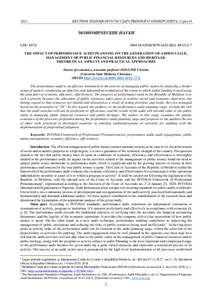Please use this identifier to cite or link to this item:
https://elib.psu.by/handle/123456789/28244Full metadata record
| DC Field | Value | Language |
|---|---|---|
| dc.contributor.author | Dolghii, C. | - |
| dc.contributor.author | Долгий, К. В. | - |
| dc.date.accessioned | 2021-12-08T06:28:05Z | - |
| dc.date.available | 2021-12-08T06:28:05Z | - |
| dc.date.issued | 2021 | - |
| dc.identifier.citation | Dolghii, K. The impact of performance audit planning on the generation of added value, management of public financial resources and heritage. Theoretical aspects and practical approaches / K. Dolghii // Вестник Полоцкого государственного университета. Серия D, Экономические и юридические науки. - 2021. - № 13. - С. 2-7. | ru_RU |
| dc.identifier.issn | 2070-1632 | - |
| dc.identifier.uri | https://elib.psu.by/handle/123456789/28244 | - |
| dc.description.abstract | The performance audit is an effective instrument in the process of managing public money by analyzing a border range of matters, conducting an objective and independent evaluation of the extent to which public funding is used using the principles of economy, efficiency, effectiveness. The progress of performance audit in the Republic of Moldova is as well a priority because the allocation of public resources takes place to achieve social and economic objectives, but having regard to that resources are limited and allocated as a result of setting priorities and needs, they are managed based on the principles of "3E". In this regard, the auditors, at the performance audit planning stage, exclude the risk that the audit activities will not be proficient or efficacious, and the results of the audit will not add value to the public entity in managing public financial resources and public heritage. The author, in this study, examines the quality assurance of the processes performed during the performance audit planning stage and proposes to the auditors the use of other tools practiced in developed countries in selecting entities/programs or activities for auditing with the implementation of professional judgment.= Аудит эффективности является важным инструментом в процессе управления государственными ресурсами при анализе широкого круга вопросов, проведении объективной и независимой оценки степени использования государственных средств на базе принципов экономичности, эффективности и результативности. Приоритетность развития аудита эффективности в Республике Молдова обуславливается и фактом того, что государственные ресурсы, носящие ограниченный характер, направляются на достижение социальных и экономических целей и выделяются в результате определения приоритетов и потребностей, при том что механизм их управления основывается на перечисленных выше принципах «3Е». В этом контексте аудиторы на этапе планирования аудита эффективности исключают риск неэффективности (нерезультативности) аудиторского задания и того, что окончательные результаты аудита не обеспечат экономичного, результативного и эффективного управления государственными финансовыми ресурсами и государственным имуществом. В данной статье на базе практических подходов автор исследует механизм обеспечения качества процессов, выполняемых на этапе планирования аудита эффективности, и предлагает аудиторам, кроме применения профессионального суждения, использовать при выборе учреждений/программ или их деятельности и другие инструменты аудита эффективности, практикуемые в развитых странах. | ru_RU |
| dc.language.iso | en | ru_RU |
| dc.publisher | Полоцкий государственный университет | ru_RU |
| dc.relation.ispartof | Веснік Полацкага дзяржаўнага ўніверсітэта. Серыя D, Эканамічныя і юрыдычныя навукі | be_BE |
| dc.relation.ispartof | Herald of Polotsk State University. Series D, Economics and law sciences | en_EN |
| dc.relation.ispartof | Вестник Полоцкого государственного университета. Серия D, Экономические и юридические науки | ru_RU |
| dc.relation.ispartofseries | Серия D, Экономические и юридические науки;2021. - № 13 | - |
| dc.rights | open access | ru_RU |
| dc.subject | Государственный рубрикатор НТИ - ВИНИТИ::ОБЩЕСТВЕННЫЕ НАУКИ::Экономика и экономические науки | ru_RU |
| dc.subject | INTOSAI Framework of Professional Pronouncements | ru_RU |
| dc.subject | Performance audit | ru_RU |
| dc.subject | Audit engagement | ru_RU |
| dc.subject | Public money management | ru_RU |
| dc.subject | Economy | ru_RU |
| dc.subject | Efficiency | ru_RU |
| dc.subject | Effectiveness | ru_RU |
| dc.subject | Декларация ИНТОСАИ | ru_RU |
| dc.subject | Аудит эффективности | ru_RU |
| dc.subject | Аудиторское задание | ru_RU |
| dc.subject | Управление государственными средствами | ru_RU |
| dc.subject | Экономичность | ru_RU |
| dc.subject | Эффективность | ru_RU |
| dc.subject | Результативность | ru_RU |
| dc.title | The impact of performance audit planning on the generation of added value, management of public financial resources and heritage. Theoretical aspects and practical approaches | en |
| dc.title.alternative | Влияние процессов планирования аудита эффективности на результативность управления государственными финансовыми ресурсами и имуществом. Теоретические аспекты и практические подходы | ru_RU |
| dc.type | Article | ru_RU |
| dc.identifier.udc | 657.6 | - |
| dc.identifier.doi | 10.52928/2070-1632-2021-58-13-2-7 | - |
| Appears in Collections: | 2021, № 13 | |
Items in DSpace are protected by copyright, with all rights reserved, unless otherwise indicated.
